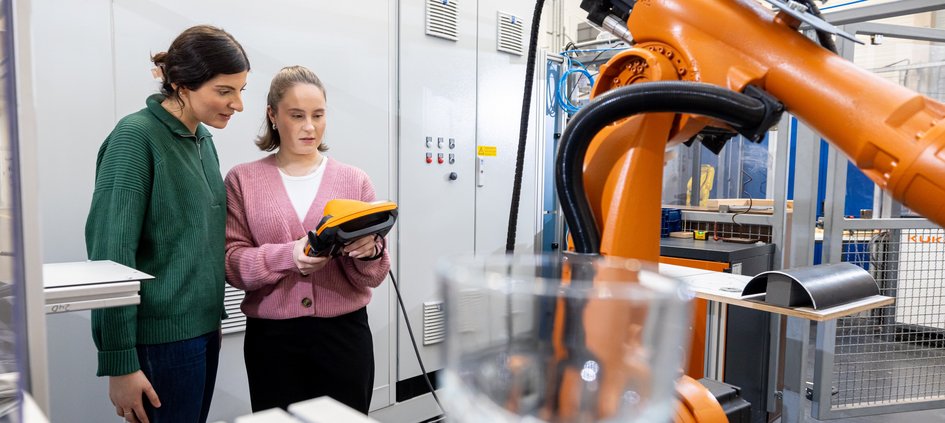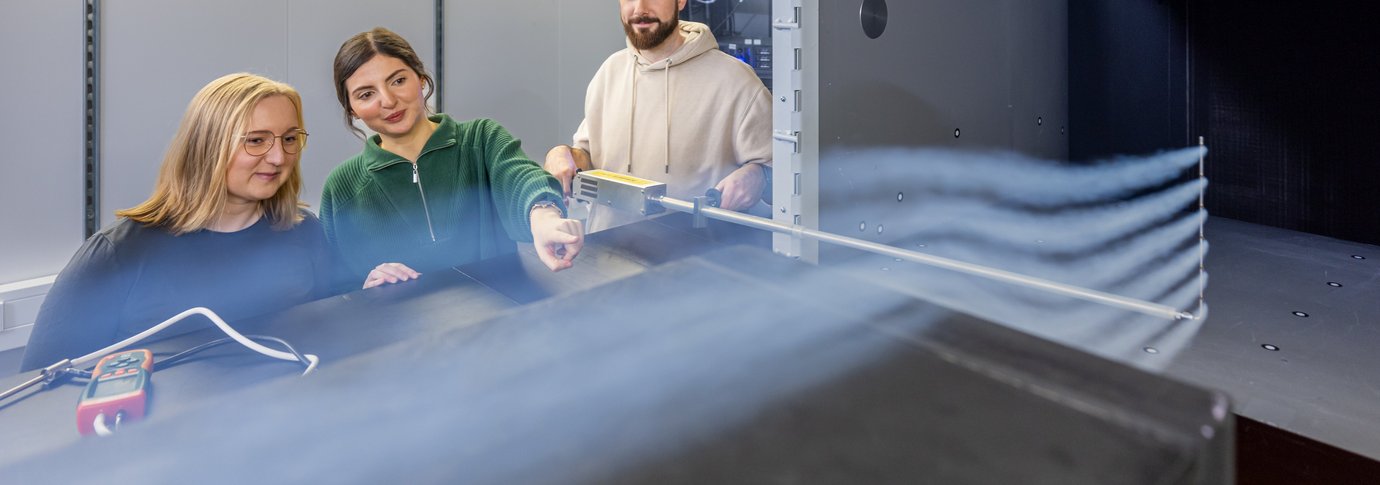Automotive Engineering
Are you interested in vehicles, diagnostic procedures and current challenges in the mobility industry?
The practical Automotive Engineering degree programme at Ostfalia University provides you with all the skills you need to actively shape the mobility of the future.
Topics of the degree programme - contents at a glance
You can expect a wide range of future-relevant content on the Automotive Engineering degree programme.
Fundamentals of automotive engineering: design, mechanics and vehicle systems.
Efficient and sustainable technologies: electromobility, battery technology and alternative drive systems (hybrid, hydrogen).
Digitalisation and networking: virtual development methods and AI-supported technologies.
Facts at a glance
why Automotive Engineering at Ostfalia?
- Practical teaching: laboratories, workshops and realistic projects.
- Individual support: Support programmes such as MatheLift make it easier for you to get started.
- Innovative teaching content: Focus on autonomous driving, vehicle networking and digital methods.
- Top career opportunities: Excellent contacts to the automotive and supplier industry.

Our goals - future-orientated and innovative
Your cookie settings have blocked this video.
We offer you a future-orientated apprenticeship that combines classic vehicle technology with modern digital technologies:
Information and communication technologies (ICT): networking and data communication in vehicle technology.
Simulation and development: use of virtual methods to optimise vehicle components.
Sustainability: focus on resource-saving technology, alternative drives and innovative recycling processes.
After graduating, you will develop visions for the mobility of the future and contribute to the transformation of the automotive industry as a specialist.
Study programme - your path to a Bachelor of Engineering
1.-3rd semester: Basic studies
In the foundation course of the Bachelor's degree programme in Automotive Engineering, you will learn the most important fundamentals of automotive engineering. This includes, for example
- Technical mechanics
- Mathematics
- Computer science
- Electronics and measurement technology
- Production engineering
Even if the content sometimes seems a little theoretical, it becomes more tangible through exercises and laboratory practicals. This allows you to directly apply what you have learnt in practice.
4.-6th semester: Choice of a subject block
The specialised studies take place in practical projects and small groups. You can choose your specialisation from 4 subject blocks. The content of the subject blocks can be found in the next section.
In the 7th semester, you will have a practical phase and write your Bachelor's thesis.
Theme blocks
You choose the subject block that suits you best. Each block comprises twelve modules. You can also choose two compulsory elective modules to further deepen your interests.
The "Aftersales, Service and Mobility" specialisation focuses on all processes relating to the vehicle in its operating phase. In addition to technical topics such as maintenance and repair, you will also learn about quality management and automotive expertise.
In the "Smart Production and Industrial Engineering" specialisation, you will learn about the industrial production processes associated with vehicles. A modern vehicle must not only be well designed, but must also be able to be produced economically and sustainably on a large scale. Sustainability is playing an increasingly important role and must be taken into account right from the vehicle design phase.
In the "Smart Automotive Development" specialisation, you will learn the most important development skills for vehicles as complex systems. You will combine the interior, exterior, drive and chassis to create a functional overall system. Modern materials science, such as lightweight construction and composite materials, as well as computer-aided simulation and optimisation play a central role in this.
The "Powertrain and Chassis Systems" specialisation covers all topics relating to the powertrain and chassis of a vehicle. As a graduate of this specialisation, you will be in demand at vehicle manufacturers and suppliers, where components for drives and chassis are specified, planned, designed, integrated and tested. This subject area is highly relevant in the Wolfsburg region in particular, but also nationally and internationally, and will continue to develop over the coming years and decades, including through sustainability, e-mobility and autonomous driving.
MathsLift - More time for the basics
With MathsLift, you can stretch your first semester over two semesters. MathsLift helps you to improve your maths skills and develop effective learning strategies. It also encourages the formation of learning groups that will support you in the long term.
You decide whether you want to take part in the MatheLift programme at the beginning of the first semester. You can find more information about the programme here.

Your career prospects - a career in the automotive and mobility industry
A degree programme in Automotive Engineering opens up a wide range of career prospects, not only in the automotive and mobility sector:
Vehicle development
- Vehicle design: development and design of vehicle components such as bodywork, chassis and drive systems.
- Powertrain development: technology-open work on conventional, hybrid and electric drives.
- Aerodynamics and lightweight construction: optimisation of the vehicle structure for improved efficiency and performance.
Research and development (R&D)
- Innovation management: development of new technologies such as autonomous driving, AI and vehicle networking.
- Alternative drives: work on hydrogen, fuel cell or battery technologies.
- Vehicle safety: development of safety concepts such as airbags, crash structures and assistance systems.
Production and manufacturing
- Production planning: Optimisation of manufacturing processes and production lines.
- Quality management: Ensuring compliance with quality standards and norms.
- Process development: introducing new manufacturing technologies such as 3D printing or robotics.
- Additional qualification with KUKA, REFA and MTM integrated into the degree programme (without additional teaching hours and without extra examinations)
Management and consulting
- Project management: Management of complex development projects.
- Technical consulting: advising companies on technical challenges and innovation processes.
- Product management: Supporting the market launch of new vehicle models and technologies.
Supplier industry and services
- Automotive suppliers: Development of components such as brakes, electronic systems and sensors.
- Engineering services: Technical support and consulting for automotive manufacturers and start-ups.
- Testing and expert witness: Expertise TÜV / DEKRA / GTÜ / IHK etc.
Alternative careers
- Company foundation: Starting your own company in the field of automotive technologies or mobility solutions.
- Technical sales/procurement/quality assurance: Sales of technical products and vehicle components.
- Teaching and science: Lecturing at universities or research institutions.
- Agriculture and forestry: Tractors; harvesting machines, working machines
- Trailers: Trailers, semi-trailers, low-loaders, special trailer superstructures (e.g. cranes, swap bodies, compressors, etc.).
- Process development in vehicle construction: e.g. additive manufacturing (3D printing)
- National defence: Trucks, vans, armoured vehicles, etc.
Future trends & growth areas
- Energy management (electromobility, hybrid drives, combustion engines)
- Autonomous and connected driving
- Sustainable resource management
- Energy management
- Software and AI-supported mobility developments
The programme combines the best of 3 worlds: Classic vehicle construction, digitalisation and climate protection (resource conservation).
It is the best foundation for a career in dynamic and innovation-driven industries with a global reach.
Possible Master's programme
In addition to the Master's degree programmes offered by the Faculty of Automotive Engineering, you can also take advantage of the wide range of Master's degree programmes offered by Ostfalia or other educational institutions. The Faculty of Automotive Engineering offers 3 Master's degree programmes: Automotive Engineering (external link, opens in a new window), Automotive Systems Technologies (external link, opens in a new window)(part-time programme) and Automotive Service Technology and Processes (external link, opens in a new window).

